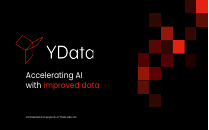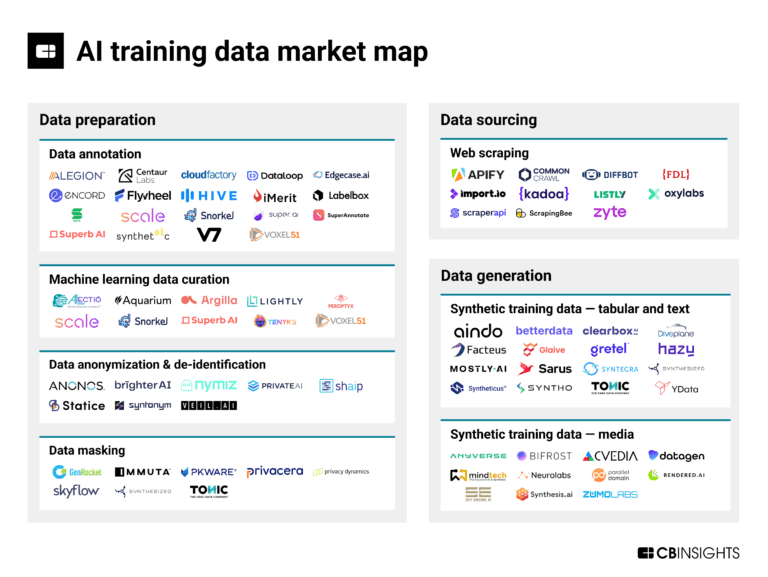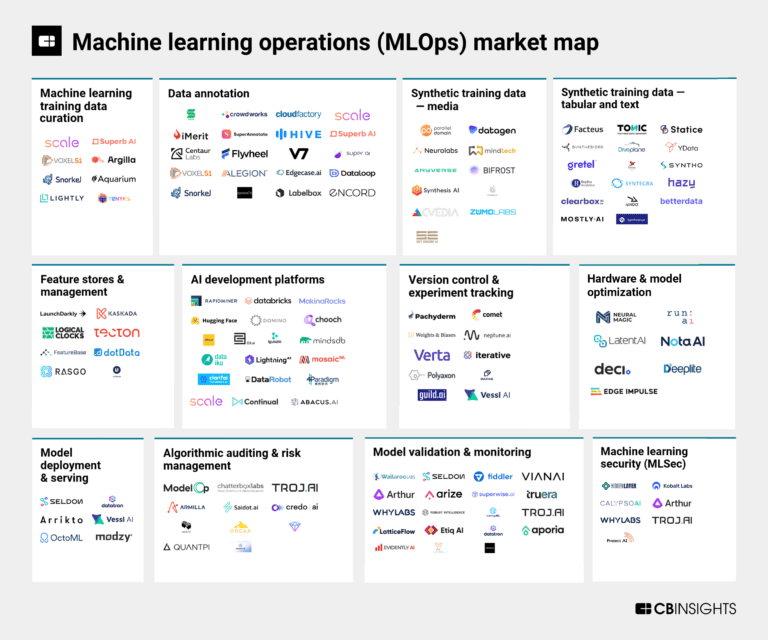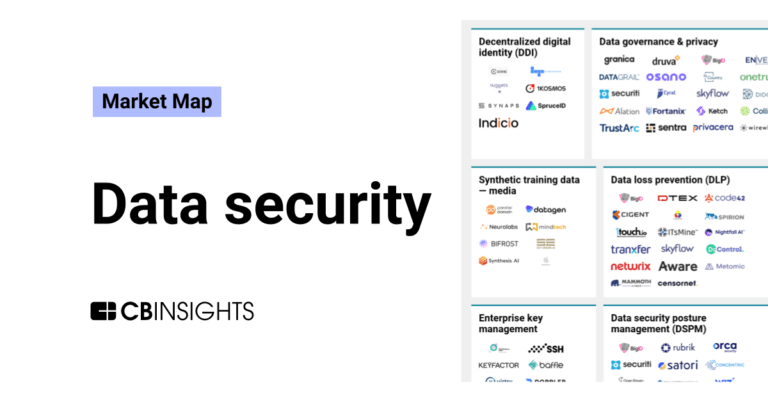
Ydata
Founded Year
2019Stage
Incubator/Accelerator - III | AliveTotal Raised
$3.42MMosaic Score The Mosaic Score is an algorithm that measures the overall financial health and market potential of private companies.
-102 points in the past 30 days
About Ydata
YData is a company that provides services related to data quality and management for data science and AI development. Their main offerings include synthetic data generation, data profiling, and preparation pipelines. YData's solutions are utilized by sectors such as financial services, telecommunications, healthcare, and retail. It was founded in 2019 and is based in Seattle, Washington.
Loading...
Ydata's Product Videos


ESPs containing Ydata
The ESP matrix leverages data and analyst insight to identify and rank leading companies in a given technology landscape.
The data profiling & analysis market provides tools for examining and analyzing datasets to understand their structure, content, patterns, and statistical characteristics. These solutions perform point-in-time analysis to discover data types, value distributions, relationships, and potential quality issues through automated scanning and statistical analysis. Key capabilities include column profili…
Ydata named as Challenger among 7 other companies, including Snowflake, Oracle, and IBM.
Loading...
Research containing Ydata
Get data-driven expert analysis from the CB Insights Intelligence Unit.
CB Insights Intelligence Analysts have mentioned Ydata in 3 CB Insights research briefs, most recently on Feb 20, 2024.

Feb 20, 2024
The AI training data market map
Sep 29, 2023
The machine learning operations (MLOps) market map
Sep 6, 2023
The data security market mapExpert Collections containing Ydata
Expert Collections are analyst-curated lists that highlight the companies you need to know in the most important technology spaces.
Ydata is included in 2 Expert Collections, including Cybersecurity.
Cybersecurity
11,251 items
These companies protect organizations from digital threats.
Artificial Intelligence (AI)
20,894 items
Ydata Patents
Ydata has filed 1 patent.
The 3 most popular patent topics include:
- data management
- database management systems
- dimension reduction

Application Date | Grant Date | Title | Related Topics | Status |
|---|---|---|---|---|
2/1/2023 | Machine learning, Data management, Software testing, Dimension reduction, Database management systems | Application |
Application Date | 2/1/2023 |
|---|---|
Grant Date | |
Title | |
Related Topics | Machine learning, Data management, Software testing, Dimension reduction, Database management systems |
Status | Application |
Latest Ydata News
Feb 3, 2025
| Membership (fee-based) getty Ranging from smart home gadgets to personal health devices to industrial machinery equipped with sensors, Internet of Things technology is transforming how people and businesses carry out their daily activities. As the IoT expands and is enhanced with technologies like AI, it offers companies innovative ways to study and serve their customers and provides consumers with more robust, personalized services and new ways to interact with the world around them. Below, members of Forbes Technology Council discuss emerging trends in IoT technology. Read on to learn some of the new and surprising ways the IoT is evolving and being merged with other cutting-edge technologies to drive industrial innovation and higher-quality services, as well as new challenges that are arising as the IoT’s footprint grows. 1. Emotion-Aware Devices An emerging IoT trend is the rise of emotion-aware devices that use sensors and artificial intelligence to detect human emotions through voice, facial expressions or physiological data. For businesses, this opens doors to hyper-personalized customer experiences in industries like retail and healthcare. For consumers, it means more empathetic tech—think stress-relieving smart homes or wearables that detect and respond to anxiety. - Milavkumar (Milav) Shah , Amazon Web Services 2. Integration Of AI-Driven Analytics One emerging trend in IoT technology is the increasing integration of AI-driven analytics into IoT devices. This convergence enables devices not only to collect data, but also to analyze and act upon it in real time. - Jason (Jiehui) Zeng , SHOPPEDANCE INC. MORE FOR YOU 3. The Need To Adapt To ‘Less Connected’ Environments The increasing prevalence of IoT tech means that it is being increasingly deployed into “less connected” environments (for example, areas with weak or intermittent cell coverage). As a result, the user experience needs to be adapted so that it’s not wholly dependent on good connectivity—instead, priorities must include how to gracefully handle data gaps and robust fallbacks with missing control instructions. - Nick Tudor , Whitespectre 4. The New Continuum Of Computing The big change that has come with IoT and edge computing is the breakdown of a dualistic (client-server) model into a continuum of computing. Today’s new IoT challenge is figuring out how to schedule chunks of compute to best leverage on-device, far-edge, near-edge, cloud and datacenter computing. - Matt Butcher , Fermyon Technologies 5. More Personalized Interactions One emerging IoT trend is the rise of personalized experiences powered by smart devices and AI. IoT systems can now learn user preferences, optimizing everything from home automation to healthcare. For businesses, this means deeper customer engagement and loyalty; for consumers, it translates to more intuitive, seamless interactions that enhance daily life. - Andrew Kucheriavy , Intechnic 6. More Precise Data Collection Advances in sensor hardware are enhancing the IoT by enabling more precise data collection. This, in turn, delivers more accurate AI insights for businesses and improved experiences for consumers. - Gonçalo Ribeiro , YData 7. Self-Healing Networks An emerging trend is self-healing networks. They use AI to detect, diagnose and resolve connectivity issues automatically. By minimizing downtime and maintenance needs, this enhances reliability and efficiency for businesses and consumers. As IoT ecosystems expand in complexity, self-healing networks will ensure seamless operations, reduce costs and improve user experiences. - Alexis Vertefeuille , Sinistar 8. Devices Capable Of Real-Time Decision-Making The IoT has truly come into its own over the past few years, and 2025 is poised to see its biggest leap yet. With AI integration, devices are no longer just connected—they’re capable of real-time decision-making. For businesses, this means smarter strategies and hyper-personalized customer engagement. For consumers, it’s devices that can predict, simplify and deliver experiences tailored to their lives. - Jeremy Barnett , RAD Intel 9. Smart Sensors For Predictive Maintenance One emerging trend in IoT technology is the rise of smart sensors for predictive maintenance. These sensors can monitor equipment health in real time and predict failures before they happen. For businesses, this reduces downtime and maintenance costs, while consumers benefit from more reliable products. Further, the manufacturing and transportation industries could use this data to develop more sustainable approaches. - Bhaskar Gangipamula , Quadrant Technologies 10. Growth Of The IIoT While not a newly emerging trend, the Industrial Internet of Things is an area of focus for manufacturers seeking greater efficiency, productivity and safety. Connecting machines and systems with a centralized work management platform gives manufacturers access to real-time data. Applying AI and machine learning to that data uncovers insights on performance, efficiency and safety, helping manufacturers optimize workflows and enhance automation. - Ed Jennings , Quickbase 11. Enhanced Smart City Networks The convergence of AI and the IoT within smart city networks is reshaping urban landscapes. By analyzing data in real time, these systems enhance traffic flow, improve public safety and optimize utility use, offering businesses new innovation opportunities and enhancing the urban experience for consumers with efficient, responsive services. - Dmitry Mishunin , HashEx 12. 5G-Powered Technology A key IoT trend is 5G-powered technology. 5G offers faster speeds and more reliable connections with fewer delays. This helps in three ways: 1. higher bandwidth, 2. lower latency, and 3. more connected devices. Across the globe, hospital staff have used 5G to monitor patients remotely, making healthcare delivery much smoother. Indeed, 5G is making everything smarter and faster. - Cristian Munoz , Mercado Livre 13. Edge Computing A key development in the IoT is edge computing. Instead of sending all collected data to the cloud, edge computing enables data to be processed closer to where it is generated. The key impacts are that less data is used, data is more secure and response times are reduced. - Dileep Marway , AND Digital 14. Biometric Ecosystems In Everyday Objects An emerging IoT trend is the integration of biometric ecosystems into everyday objects, such as furniture, vehicles and appliances. Imagine a smart chair adjusting posture support based on real-time muscle tension or a car seat syncing with wearables to monitor driver fatigue. This hyper-personalization could redefine industries, from wellness-focused workplaces to insurance models. - Charles Morey , MobilEyes Inc. 15. ‘Mini’ LLMs The AI-integrated IoT is advancing through “mini” large language models—like compact versions of ChatGPT—designed to work on devices with limited resources. These models enable natural language processing directly on IoT devices, reducing latency, enhancing privacy and improving reliability. With applications in smart homes, vehicles and industrial settings, mini LLMs drive smarter, more efficient IoT solutions. - Nishant Satya Lakshmikanth , LinkedIn 16. Growing Cybersecurity Risk The number of IoT devices has increased exponentially in the last decade. Advances in AI and ML and low-cost cloud technology have enabled more use cases for the IoT as well as enhanced efficiency in real-time tracking and analysis and more accurate decision-making. However, the interconnectedness of billions of IoT devices creates cybersecurity risks, resulting in supply chain vulnerabilities that need risk qualification. - Joydeb Mandal , Accenture 17. Interoperability Standards The rise of IoT interoperability standards, like Matter, is transforming the industry by enabling seamless communication across smart devices from different brands. For businesses, this reduces fragmentation, accelerates innovation and opens new collaboration opportunities. For consumers, it simplifies smart home adoption, making devices easier to integrate, control and scale over time. - Andres Zunino , ZirconTech 18. ‘Green’ IoT As sustainability emerges as a key priority, “green” IoT is expected to rise. This shift compels tech providers to adopt more responsible approaches to choosing technologies and software development methods. AI, ML and cloud computing play crucial roles in this. The combination of these technologies enables the creation of software that minimizes energy consumption and reduces environmental impact. - Oleg Lola , MobiDev 19. A Tighter Focus On Security And Trust We live in an age where SMS can be hacked, drone data is questioned and social media algorithms are scrutinized. Anything related to entertainment or business will face increased scrutiny. Zero-knowledge encryption is becoming more relevant. IoT device manufacturers face the challenge of ensuring their products are secure, can be trusted and are not used for anything other than what they were built for. - WaiJe Coler , InfoTracer 20. Space-Based Networks The rise of space-based IoT networks using low-Earth-orbit satellites provides global, real-time connectivity in remote areas. It improves asset tracking, supply chain visibility and predictive maintenance for businesses. For consumers, it enhances smart devices in rural areas, supporting precision farming and emergency response and boosting efficiency, safety and accessibility. - Shelli Brunswick , SB Global LLC Check out my website .
Ydata Frequently Asked Questions (FAQ)
When was Ydata founded?
Ydata was founded in 2019.
Where is Ydata's headquarters?
Ydata's headquarters is located at 92 Lenora Street, Seattle.
What is Ydata's latest funding round?
Ydata's latest funding round is Incubator/Accelerator - III.
How much did Ydata raise?
Ydata raised a total of $3.42M.
Who are the investors of Ydata?
Investors of Ydata include Kickstart Accelerator, Flying Fish Venture Partners, EDP Ventures, Real Ventures, Faber Ventures and 5 more.
Who are Ydata's competitors?
Competitors of Ydata include Tonic AI, Synthesized, Snorkel AI, Modulos, Gretel and 7 more.
Loading...
Compare Ydata to Competitors

Mostly AI specializes in creating synthetic data within the technology and data security sectors. The company offers a platform and an open-source Software Development Kit (SDK) that enables organizations to generate, analyze, and share synthetic data, allowing for data insights and collaboration. Mostly AI's solutions support applications such as machine learning (AI) machine learning (ML) model training, software testing, and data sharing, while addressing privacy regulations. It was founded in 2017 and is based in Vienna, Austria.

Tonic AI focuses on synthetic data generation and privacy compliance within the software and AI development sectors. The company provides products for the creation, management, and de-identification of test data to support application development, testing, and AI model training while adhering to data privacy regulations. Tonic AI's solutions serve various sectors including financial services and healthcare. It was founded in 2018 and is based in San Francisco, California.

Synthesized provides test automation solutions within the software development and testing industry. The company offers a platform that automates test data generation, provisioning, and execution, aimed at application testing. Synthesized serves sectors that require testing and compliance, including banking, financial services, healthcare, and enterprise applications. It was founded in 2018 and is based in London, United Kingdom.

Betterdata provides data privacy solutions. It offers data privacy solutions, including product development and testing, data collaborations, data privacy verification, imbalance mitigation, and more. The company was founded in 2021 and is based in Singapore.

Sarus focuses on analytics and artificial intelligence (AI) solutions within the technology sector that prioritize data privacy and security. The company provides a privacy layer that facilitates research, analytics, and AI on sensitive data, while ensuring compliance and security without direct data access. Sarus serves sectors that require strict data privacy measures, including finance, healthcare, and public sector organizations. It was founded in 2020 and is based in Paris, France.
Dedomena operates in the fields of artificial intelligence and data science, focusing on synthetic data generation, data anonymization, and AI model enhancement. The company provides services that help businesses handle GDPR-compliant data. Dedomena's platform serves various industries, including banking and healthcare, by providing functionalities related to data management. It was founded in 2021 and is based in Madrid, Spain.
Loading...
